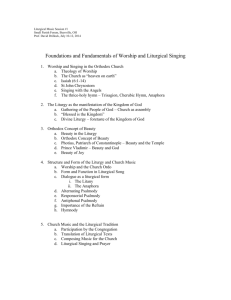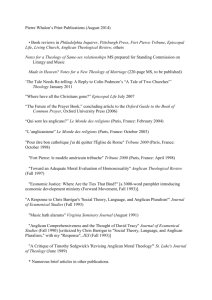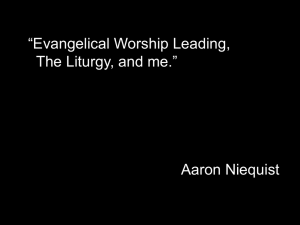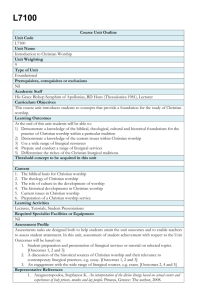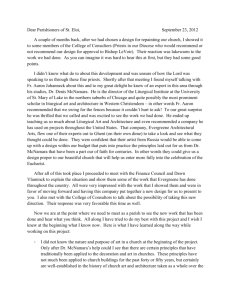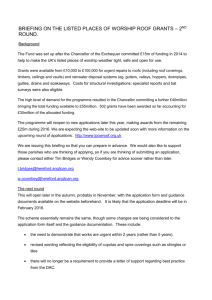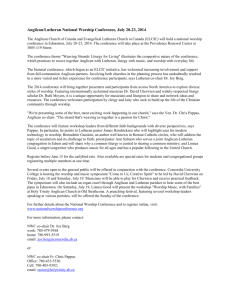Fall Term 2007 - Trinity School for Ministry
advertisement
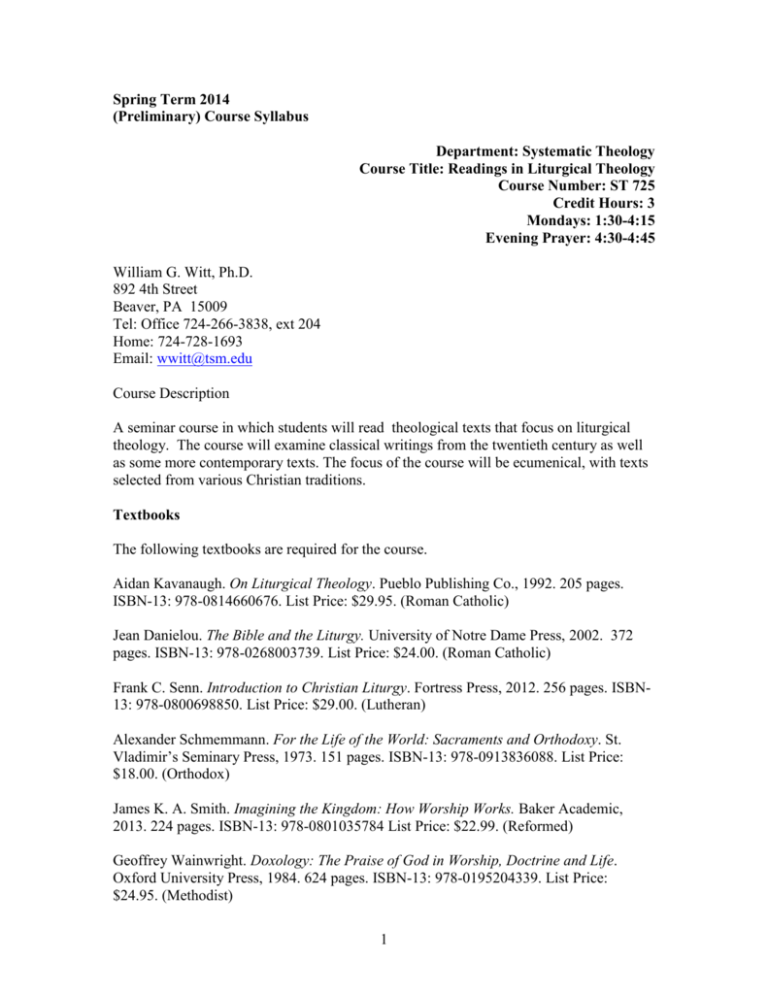
Spring Term 2014 (Preliminary) Course Syllabus Department: Systematic Theology Course Title: Readings in Liturgical Theology Course Number: ST 725 Credit Hours: 3 Mondays: 1:30-4:15 Evening Prayer: 4:30-4:45 William G. Witt, Ph.D. 892 4th Street Beaver, PA 15009 Tel: Office 724-266-3838, ext 204 Home: 724-728-1693 Email: wwitt@tsm.edu Course Description A seminar course in which students will read theological texts that focus on liturgical theology. The course will examine classical writings from the twentieth century as well as some more contemporary texts. The focus of the course will be ecumenical, with texts selected from various Christian traditions. Textbooks The following textbooks are required for the course. Aidan Kavanaugh. On Liturgical Theology. Pueblo Publishing Co., 1992. 205 pages. ISBN-13: 978-0814660676. List Price: $29.95. (Roman Catholic) Jean Danielou. The Bible and the Liturgy. University of Notre Dame Press, 2002. 372 pages. ISBN-13: 978-0268003739. List Price: $24.00. (Roman Catholic) Frank C. Senn. Introduction to Christian Liturgy. Fortress Press, 2012. 256 pages. ISBN13: 978-0800698850. List Price: $29.00. (Lutheran) Alexander Schmemmann. For the Life of the World: Sacraments and Orthodoxy. St. Vladimir’s Seminary Press, 1973. 151 pages. ISBN-13: 978-0913836088. List Price: $18.00. (Orthodox) James K. A. Smith. Imagining the Kingdom: How Worship Works. Baker Academic, 2013. 224 pages. ISBN-13: 978-0801035784 List Price: $22.99. (Reformed) Geoffrey Wainwright. Doxology: The Praise of God in Worship, Doctrine and Life. Oxford University Press, 1984. 624 pages. ISBN-13: 978-0195204339. List Price: $24.95. (Methodist) 1 For Further Reading (The following are neither required nor “recommended for purchase.” The Senn text has good bibliographies at the end of each chapter. In addition, you may find the following helpful for your own research or just to learn more about liturgy and liturgical theology. Many of these are considered “standard texts.”) Bruce Ellis Benson. Liturgy as a Way of Life: Embodying the Arts in Christian Worship. Grand Rapids: Baker Academic, 2013. (Evangelical Philosopher) Louis Bouyer. Eucharist: Theology and Spirituality of the Eucharistic Prayer. Notre Dame, IN: University of Notre Dame Press, 1989. (Roman Catholic) Louis Bouyer. Liturgical Piety. Notre Dame, IN: University of Notre Dame Press, 1954. (Roman Catholic) Paul F. Bradshaw. Early Christian Worship: A Basic Introduction to Ideas and Practice, 2nd Edition. Liturgical Press, 2011. (Anglican) Colin Buchanan. Evangelical Anglicans and Liturgy. Grove Books, 1984. (Anglican) Colin Buchanan. What Did Cranmer Think He Was Doing? Grove Books, 1982. (Anglican) Paul F. Bradshaw. The Search for the Origins of Christian Worship. 2Nd edition. New York: Oxford University Press, 2002. (Anglican) Odo Casel. The Mystery of Christian Worship. Crossroad Publishing Co., 1999. (Roman Catholic) Simon Chan. Liturgical Theology: The Church as Worshiping Community Downers Grove: InterVarsity Press, 2006 (Pentecostal, “Catholic Evangelical”) Oscar Cullmann. Early Christian Worship. Philadelphia: The Westminster Press, 1978. (Lutheran) Geoffrey Cuming. A History of Anglican Liturgy. London: Macmillan, 1982. (Anglican) Lucien Deiss. Springtime of the Liturgy: Liturgical Texts of the First Four Centuries. Liturgical Press, 1979 (Roman Catholic; collection of patristic texts) Gregory Dix. The Shape of the Liturgy (New Edition). Bloomsbury Academic, 2005. (Anglican) C.W. Dugmore. The Mass and the English Reformers. St. Martin’s Press, 1958. (Anglican) 2 Edward Foley. From Age to Age: How Christians Have Celebrated the Eucharist. Liturgical Press, 2009. (Roman Catholic) Romano Guardini. The Spirit of the Liturgy. Crossroad Publishing Co., 1998. (Roman Catholic) Leander S. Harding. In the Breaking of the Bread: A User’s Guide to a Service of Communion in the Anglican Tradition. Eugene,OR: Wipf & Stock, 2010. (Episcopal/Anglican) Leander S. Harding. To Persevere in Love: Meditations on the Ministerial Priesthood from an Anglican Perspective. Eugene,OR: Wipf & Stock, 2013. (Episcopal/Anglican) George Hunsinger. The Eucharist and Ecumenism: Let us Keep the Feast. Cambridge: Cambridge University Press, 2008. (Reformed) R.C.D. Jasper and Geoffrey Cuming. Prayers of the Eucharist: Early and Reformed. Liturgical Press, 1987. (Anglican, collection of historical texts) Cheslyn Jones, Edward Yarnold, Geoffrey Wainwright, Paul Bradshaw. The Study of Liturgy. NY: Oxford University Press, 1992. (various) Joseph A. Jungmann. The Mass of the Roman Rite: Its Origins and Development. 2 vols. Christian Classics, 2012. (Roman Catholic) H. R. McAdoo and Kenneth Stevenson. The Mystery of the Eucharist in the Anglican Tradition. Wipf & Stock, 2008; Canterbury Press, 2012. (Anglican) Joseph Cardinal Ratzinger (Pope Benedict). The Spirit of the Liturgy. San Francisco: Ignatius Press, 2000. (Roman Catholic) Alexander Schmemmann. Introduction to Liturgical Theology. St. Vladimir’s Seminary Press, 1966. (Orthodox) Frank C. Senn. Christian Liturgy: Catholic and Evangelical. Minneapolis: Augsburg Fortress, 1997. (Lutheran) Massey H. Shepherd, Jr., ed. The Liturgical Renewal of the Church. NY: Oxford University Press, 1960 (Episcopal/Anglican) Massey H. Shepherd, Jr. The Worship of the Church (Vol. 4 The Church’s Teaching). Greenwich, CT: The Seabury Press, 1952. (Episcopal/Anglican) Kenneth Stevenson, ed. Liturgy Reshaped. London: SPCK, 1982. (Anglican) 3 Kenneth Stevenson. The Mystery of Baptism in the Anglican Tradition. Harrisburg: Morehouse Publishing, 1998. (Anglican) George R. Sumner. Being Salt: A Theology of an Ordered Church. Wipf & Stock, 2007. (Anglican) Robert F. Taft. The Byzantine Rite: A Short History. Liturgical Press, 1992. (Roman/Eastern Catholic) Bard Thompson. Liturgies of the Western Church. Fortress Press, 1980. (United Church of Christ, collection of liturgical texts) Bard Thompson. Bibliography of Christian Worship. Scarecrow Press, 1989. (United Church of Christ, somewhat outdated) Max Thurian. The Mystery of the Eucharist: An Ecumenical Approach. Grand Rapids: Eerdmans, 1984. (Taize, later Roman Catholic convert) Max Thurian. Priesthood and Ministry: Ecumenical Research. Mowbray, 1983. (Taize, later Roman Catholic convert) T. F. Torrance. Theology in reconciliation: Essays towards Evangelical and Catholic Unity in East and West. Wipf & Stock, 1996. (Reformed) T. F. Torrance. A Theology of Ordained Ministry. T & T Clark, 2000. (Reformed) Evelyn Underhill. Worship. New York: Crossroad Publishing Co., 1989. (Anglican) Abbot Vanier. A Key to the Doctrine of the Eucharist. Zaccheus Press, 2003 (Roman Catholic) Geoffrey Wainright. Eucharist and Eschatology. Order of St. Luke’s Publishing, 2002 (Methodist) Geoffrey Wainwright, ed.. The Oxford History of Christian Worship. NY: Oxford University Press, 2005 (various) Robert E. Webber. Worship Old and New. Grand Rapids: Zondervan, 1994. (Episcopal/Anglican) Meletios Weber. Bread & Water, Wine & Oil: An Orthodox Christian Experience of God. Conciliar Press, 2007. (Orthodox) James F. White. Introduction to Christian Worship. 3Rd edition. Nashville: Abingdon Press, 2000. (Methodist) 4 William H. Willimon. Pastor: The Theology and Practice of Ordained Ministry. Nashville: Abingdon Press, 2002. (Methodist) William H. Willimon. Word, Water, Wine, and Bread: How Worship Has Changed Over the Years. Valley Forge, PA: Judson Press, 1980. (Methodist) Other Sources: Four helpful additional sources include the Episcopal Church series Prayer Book Studies, the Anglican Alcuin Club texts, the Anglican series Grove Books,and the Roman Catholic/ecumenical journal Worship, all four published for several decades. What is Liturgical Theology? In Frank Senn’s book, Introduction to Christian Liturgy, he provides a list of “liturgical data”: Sunday as the day of Christian worship; the Sunday liturgy of Word and Meal, texts of the liturgy, principles parts of the liturgy, roles in the liturgical assembly (preacher, presider), etc. One could also add here such things as the liturgical year and the use of a lectionary of biblical texts. Senn suggests that “Deriving meaning from this data is what liturgical theology purports to do. It does not ask, What is the meaning of liturgy or worship? It asks rather, What meanings are conveyed in the texts and actions, and even the ordo of the liturgy?” I would disagree somewhat with Senn by suggesting that liturgical theology does both. Liturgical theology is the systematic theological reflection that addresses the theological meaning of the specific texts, actions, and ordo of the liturgy (in agreement with Senn), but also reflects theologically on the general meaning of liturgy or worship. What Litugical Theology is not: At the same time, liturgical theology needs to be distinguished from several other parallel but related disciplines. History of the liturgy or of Christian worship is presupposed in the discussion of liturgical theology, but liturgical theology is not simply history of the liturgy, insofar as it is theological reflection on the meaning of liturgical worship. Neither is liturgical theology identical with a theology of the sacraments or orders as they might be discussed in the field of systematic theology because liturgical theology focuses specifically on the theology of worship, and the role that “liturgical data” such as sacraments and ordained clergy play in liturgical worship. Liturgical theology is largely a discipline that began in the twentieth century with the “liturgical renewal” movement, and perhaps the best way to become acquainted with liturgical theology is to read some of the classic texts that were produced by significant figures in this movement. The primary goal of this course will be to read some of these “classic texts” in seminar format in order to provide an introduction to liturgical theology. At the same time, a couple of more recent texts will be included in the readings. The “liturgical renewal movement” was an ecumenical movement that included figures in all of the major Christian churches that practice liturgical worship. Significant figures 5 included Roman Catholics, Eastern Orthodox, Anglican, Lutheran, Methodist and Reformed theologians. Our representative selection of texts therefore includes figures from different theological traditions: Roman Catholic, Orthodox, Lutheran, Methodist, Reformed. Surprisingly, perhaps, the student will notice that the assigned textbooks do not include any Anglican authors, although there are several on the “further readings” list. The primary reason for this is that, although Anglicans have written much about the liturgy, Anglican liturgical writers have tended to focus on either the history of liturgy and the Prayer Book (Dix, Cuming, Bradshaw) or on specific issues in Anglican sacramental theology (Stevenson). In narrowing down the specific readings for this introductory course, the best texts that I was able to find on liturgical theology proper were written by non-Anglicans. Nonetheless, several of the course texts do discuss and interact with Anglicanism (both Anglican Prayer Book worship and Anglican sacramental theology), and students are encouraged to read Anglican writers in addition to the assigned texts in preparing for their seminar presentations, but also in writing their final research paper. Course Objectives By the end of the course, you should be familiar with numerous texts that focus on liturgical theology. You should have a good grasp of crucial themes in liturgical theology. You should be able to address such questions as What is worship? How does the liturgy relate to other areas of theology? How does liturgy form the life of the church in not only worship, but also theology and ethics? You should be able to analyze theological arguments, and respond competently to questions about theological issues, both orally and in writing. You should be able to show how the practice of liturgical worship has relevance for contemporary theological concerns. You should have greater clarity about your own Christian theological convictions. Course Requirements Please reading the assigned texts in in advance of the class, so that you can play a part in class discussions. At the beginning of the course, each student will submit a very short informal paper (no less than three to five and no more than five to ten pages) in which he or she summarizes their present answer to the question “What is worship, and why is it important”? This is not a research paper, but personal reflection. It is required, but will not be graded. The course will be taught as a seminar. Each class will be divided into two sessions, with a break approximately halfway through the class. The first half of the class will be devoted to the assigned reading from Wainwright. The second half of the course will 6 focus on the other assigned reading. In addition to the assigned readings, individual students will be responsible to lead one of the two seminar sessions on the day’s readings. The student (or students if doing a combined presentation) leading the discussion for the day will be expected to produce a summary of the reading with an analysis and critical evaluation of the argument. Your presentations should summarize the ideas of the reading for the session, comment on what the author says, show where you agree or disagree. Raise two or three questions for discussion at the end. These questions should lead to class discussion of the implications of the reading. The seminar notes may be in outline form. Because of the necessity of covering (at least) two presentations each week, presentations must be kept to strict time limits. Please submit copies of your presentation to the Discussion area in Edvance360 at least one day in advance. (Permanent electronic copies are required for ATS outcomes assessment. Copies not posted electronically will not receive credit.) The number of seminar presentations will depend on the number of students in the class. Each student will also prepare a research paper on some specific theological issue raised in one’s study of liturgical theology. The paper would likely focus on the work of one or more of the authors read in the course, but could conceivably examine other works. If desired, the entire focus of the paper could be an expanded version of the initial paper that addressed the questions, but now incorporating the course readings. Note: If the student desires to write the final paper on a figure not read in the course, please consult with the instructor for approval of subject matter. The final papers should be no less than ten and no more than fifteen to twenty pages in length. (Final papers must be posted to the Edvance360 Drop Box. Permanent electronic copies are required for ATS outcomes assessment. Copies not posted electronically will not receive credit.) The final paper will be due May 16, the last day permitted by the registrar. Seniors are required to submit final work by April 28. Course Evaluation The seminar presentations will constitute 60% of the grade. The final paper will constitute 30% of the grade. Class Participation will constitute 10% of the grade. Grades 7 The Academic Bulletin assigns the following values to grades: A B C D F Excellent Good Average Failure Failure In the liberal arts, there is always a subjective element in grading insofar as grades reflect qualitative work rather than quantitative measures. For theological work, a number of factors enter into grading: competence in understanding and summarizing material; insightful comments; thoughtful argumentation in addition to summarizing and commenting. Generally, the more of these factors that are present, the higher the grade, but other factors will also be taken into account, for example, organizational coherence, narrative flow of argument, lucidity. (Longer is not necessarily better.) Course Schedule Week 1: January 27 Introduction and Syllabus Read in advance Wainwright: Introduction, 1-14 Week 2: February 3 Wainright, ch 1, 15-44 Senn, ch 1-3 Week 3: February 10 Wainright, ch 2, 45-86 Senn, ch 4-8 Week 4: February 17 Wainright, ch 3, 87-117 Senn, ch 9-11 Week 5: February 24 Wainright, ch 4, 118-146 Danielou, 1-53, 70-113 8 Week 6: March 3 Wainwright, ch 5, 149-181 Danielou, 127-176 March 10-14 Reading Week (NO CLASS) Week 7: March 17 Wainright, ch 6, 182-217 Kavanagh, 1-51 Week 8: March 24 Wainwright, ch 7, 218-250 Kavanagh, 52-95 Week 9: March 31 Wainwright, ch 8, 251-283 Kavanagh, 96-179 Week 10: April 7 Wainright, ch 9, 287-323 Schmemann, 7-79 Week 11: April 14 Wainright, ch 10, 324-356 Schmemann, 81-151 April 17-21 Holy Week (NO CLASS) Week 12: April 28 Wainwright, ch 11, 357-398 Smith, 1-100 Week 13: May 5 Wainwright, ch 12, Conclusion, 399-462 Smith, 101-192 9 Course Outcomes General Objectives The general set of outcomes Trinity desires for each of our graduates includes the following: 1) The student will recognize and identify the biblical theology evident in the course work. 2) The student will be able to articulate an Anglican understanding of biblical, historical, systematic, and pastoral theology. 3) The student will be able to effectively communicate the Christian message to a diversity of people in order to advance the mission of God. 4) The student will be prepared to effectively lead in a variety of Christian communities. As a seminar in liturgical, the primary focus of ST 725 is to enable students to know and to articulate an understanding of one particular area of systematic theology, but also touches subject matter concerning church history and pastoral theology. While not primarily a course in Anglican theology, because Prayer Book worship is liturgical, the course touches on issues central to Anglican identity, and which are central to Anglican understandings of the God, creation, redemption, ecclesiology, the sacraments, and other issues central to Anglican identity. While not a course in biblical exegesis or biblical theology, Scripture plays a key role in liturgy, not only in the use of a lectionary, but also in the church year, and the structure of liturgical rites. Danielieu’s book focuses on this topic. The course is less directly relevant to Outcomes 3 and 4; however, a knowledge of liturgical theology is crucial to the leading in and participation of worship (outcome 4), and, arguably, liturgical worship is itself a form of communication of the Christian message (outcome 3). . The course objectives are connected to the course requirements as follows: 1) By the end of the course, you should be familiar with numerous texts that focus on liturgical theology. This requirement should be met by the assigned readings and by seminar presentations. 2) You should have a good grasp of crucial themes in liturgical theology. You should be able to address such questions as What is worship? How does the liturgy relate to other areas of theology? How does liturgy form the life of the church in not only worship, but also theology and ethics? 10 As the course progresses, the cumulative comparison of the reading of the texts should lead to a better grasp of the above crucial themes in liturgical theology and how they relate to one another. Seminar presentations, class discussion, and the final research paper should contribute to the student’s being able to “think critically” about the subject matter of the course, the central focus of which will be devoted to addressing the questions What is worship?, etc. 3) You should be able to analyze theological arguments, and respond competently to questions about theological issues, both orally and in writing. You should be able to show how the practice of liturgical worship has relevance for contemporary theological concerns. While the seminar presentations and class discussion will contribute to the ability to “analyze theological arguments, and respond competently to questions about theological issues,” the final research paper will provide the opportunity to engage the task in written form. But this should also be a focus of the final research paper, especially that part of the paper that addresses the questions “What is liturgical worship, and why is it important”? 4) You should have greater clarity about your own theological convictions. Readings, presentations, class discussions, and final research paper should all contribute to this outcome. 11
